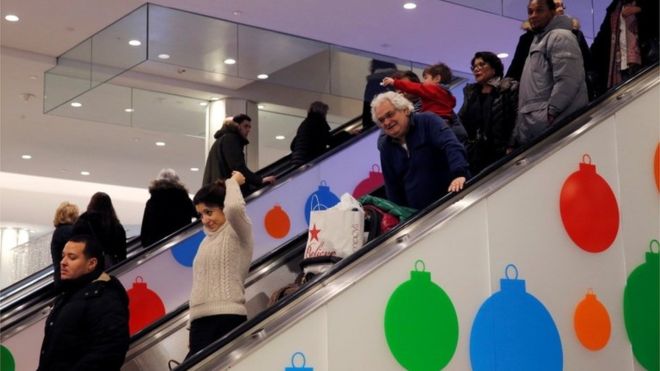
US department store chain Macy’s has seen its share price fall 14% as it cut profit forecasts and announced plans to shed 10,100 jobs to save $550m (£447m).
It said 3,900 jobs would go in 2017 as a result of 68 store closures, out of a planned 100 announced last year.
Meanwhile, other changes and reductions in middle management roles are expected to eliminate another 6,200 jobs.
Department stores in the US have been struggling with tough competition from online retailers and discount stores.
Macy’s – which owns department store Bloomingdales – also said its profits for the year to 30 January would be lower than previously forecast.
It had expected profits to be between $3.15 and $3.40 a share, but has now cut this to $2.95-$3.10.
Other US department stores also saw significant share price movements on Thursday.
Shares in Kohl’s dived 18% as it too cut its profit forecast, while Sears saw its shares rise nearly 6% after it said it would sell its Craftsman tools business to Stanley Black & Decker for $900m.
However, Sears also reported weak holiday trading, with same-store sales in November and December down by 12-13%, and announced plans to close 150 stores.
‘Necessary evil’
Macy’s revised profit forecast came after the chain’s like-for-like sales in November and December saw a fall of 2.1%.
“While our sales trend is consistent with the lower end of our guidance, we had anticipated sales would be stronger,” said Macy’s chief executive, Terry Lundgren.
Neil Saunders, from research group Conlumino, said the latest move was “a necessary evil” in order to get the company back on track.
“The blunt truth is that many of these locations are simply not going to deliver solid returns, so there is little point trying to revitalise and invest in them.
“Revitalising the business will not be easy. Shopping trends are firmly against Macy’s, and its brand, while not completely diminished, is most certainly tarnished.
“In our view, it needs to completely overhaul the experience to make stores easier to shop, more interesting to browse, and more relevant to today’s shopper.”
[Source:-BBC]



